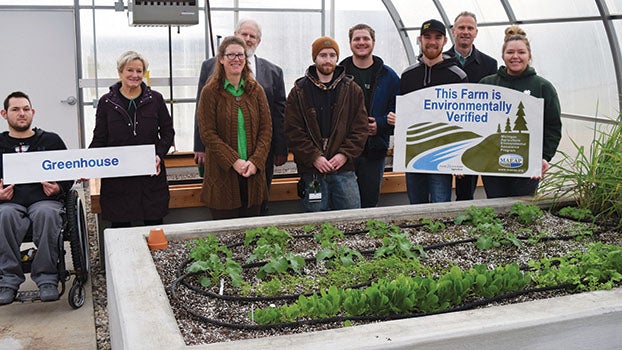SMC greenhouse MAEAP-verified
Published 8:44 am Monday, January 7, 2019

- Pictured from left: Cade Krieger, Watervliet Fruit and Vegetable Crop Management major; Vice President Susan Coulston; Stacey Rocklin, MSU Institute of Agricultural Technology; Dean of Arts and Sciences Dr. Keith Howell; Dakota Kiernan, Watervliet Landscape Management major; Niles Agricultural Operations major Jonathan Tharp; Coldwater SMC student Cameron Victor; Vice President Mike O’Brien; and Hudson Agricultural Operations major Andrea Lee, president of SMC’s Collegiate Farm Bureau club. Lee said vegetables in the foreground were planted by Honors student Natalie Adams, Edwardsburg Fruit and Vegetable Crop Management major, to provide the Roadrunner Kitchen food pantry with fresh produce. (Submitted photo)
DOWAGIAC — On Dec. 20, Southwestern Michigan College’s greenhouse completed the Michigan Agriculture Environmental Assurance Program verification process.
“Our students have taken the lead to make sure practices we use in the greenhouse are sustainable and consistent with best practices to protect everyone inside and the environment outside of the greenhouse,” said Stacey Rocklin, SMC-based regional program coordinator for Michigan State University’s Institute of Agricultural Technology. “We’re thrilled to have this designation from the state for our facility at SMC.”
MAEAP helps farms of all sizes and commodities voluntarily prevent or minimize agricultural pollution risks by recognizing and rewarding top land and water stewards in four broad categories — cropping, livestock, farmstead and forest, wetlands and habitat.
MAEAP, part of the state Department of Agriculture and Rural Development, also helps producers comply with state and federal environment regulations and with Right-to-Farm practices. Technical assistance is provided by Cass County Conservation District staff MAEAP technician Erez Brandvain.
MAEAP verification rests on three comprehensive steps, including an educational seminar, conducting a thorough on-site risk assessment and developing and implementing an action plan addressing potential environmental risks. To stay MAEAP-verified, inspections must be conducted every five years.
On average 8,000 Michigan farmers attend educational programs annually, 10,000 Michigan farms have started the verification process and more than 4,000 farms have been verified to date. Only five percent of farms have earned this designation.
“This program started in the late ’90s,” MAEAP Verifier Josh Appleby of Lawton said. “We started doing our first verifications in the early 2000s, including greenhouses. Michigan is second only to Florida in square footage of greenhouse production.”
“If they’re zoned for agriculture and follow Right-to-Farm practices, farms can’t be sued as a nuisance because of running tractors late at night, dust and manure smells,” Appleby said. “Right-to-Farm is the base, plus other state and federal regulations, such as fuel storage, pesticide containment facilities, nutrient management and record-keeping.
“Here at the college, having this verification is an opportunity to talk about values that the next generation of producers should take with them.”






